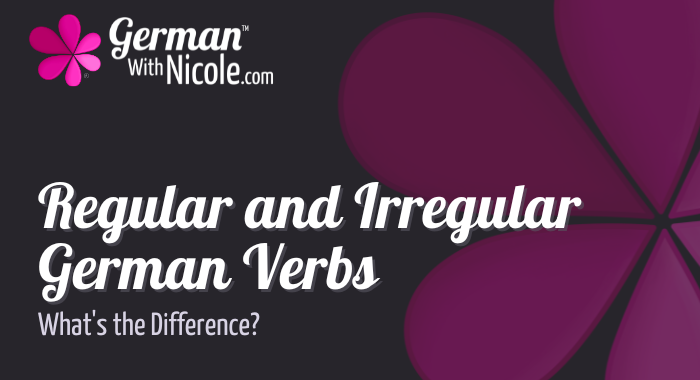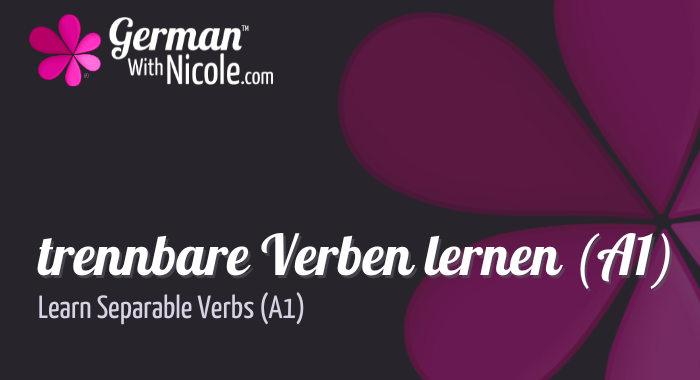Good ol'-fashioned RSS Feed
das Blog
A1
11 German Words for Holy Week and Easter (Karwoche und Ostern)
Christian Holidays are often public holidays in Germany, so these are good words to know whether you're non-religious, atheist, agnostic, or religious.
The schedule carries over into school and school breaks, too. One of my clients is currently on Osterferien, Easter Holidays, and doesn't have school this week or next.
This week is Karwoche, or Holy Week, and in a non-pandemic year there would be much singing of the Bach Passions: the Matthäus-Passion (St. Matthew Passion), the Johannes-Passio…
Regular and Irregular German Verbs: What's the Difference?
Almost all of the people who sign up for private German lessons have already run into German verbs and their conjugations.
When we get to the Perfekt (the present perfect or spoken past tense), it's always interesting to hear what they think of it so far.
Here are a few of the top questions people have asked me about learning the Perfekt:
-
Are these regular or irregular verbs?
-
What's the difference between them?
-
What's the pattern for these verbs? And for these verbs? And f…
What are the Two Most Important Past Tense Verbs in German?
When you first learn German - or first start learning German - you say everything in the present tense. You learn only a little bit of the past tense, mainly the two verbs here, and then later you learn the Perfekt, or the spoken past tense (Ich bin gefahren. Wir haben ein Buch gelesen.).
This is the order you would ideally learn everything in:
Present tense --> these two verbs --> a bunch of the Perfekt
If you learn the past tense in any other order than that, it is out of order.
No excepti…
Separable Verbs in German: an Exercise
Here is a short exercise for you to practice two separable verbs in German: einatmen and ausatmen.
You may have noticed these two verbs in a blog post earlier this month, and to help you learn them even better, you'll use them in this exercise.
This may be the most relaxing German separable verbs exercise you'll find on the interwebs.
Here are the instructions in German. Scroll down to the flower to read the instructions in English.
Hier ist ein kurzes Audio für Sie.
Zuerst hören Sie «Ich…
Lernen Sie trennbare Verben ~ Learn German Separable Verbs
Today you get to learn separable verbs (trennbare Verben) just like one of my German clients!
This is a technique I've used with dozens of German learners and it makes separable verbs a kinaesthetic exercise--and that in two different ways.
You'll need print out or write out some cards, and to have one supply to have ready when you start the video.
Los geht's!
Step 1: Print out or make these cards of trennbare Verben
Download this PDF of 4x6 cards and print them.
If you can't print them, …
How to Use Separable Verbs in German
Separable verbs are not hard to understand, however learning to use them takes practice and time.
For the purposes of this first section, we'll use two separable verbs in the present tense – so we'll use them to talk about now.
Right now.
A separable verb (in German: ein trennbares Verb, plural: trennbare Verben) is a verb that requires you to do three things :
-
remove the prefix from the verb
-
conjugate what's left
-
tack the prefix on to the end of the sentence.
That's…
Take this Relaxing Video Trip to Bavaria
Wenn man nicht reisen kann, egal ob man zu wenig Geld hat oder es eine Pandemie gibt, kann man immer das Internet benutzen, um eine virtuelle Reise zu machen.
Es kostet nichts und man kann die gleiche Reise immer wieder machen.
Diese Woche gibt es eine Videoreise nach Bayern. Sie können verschiedene Seen sehen, eine Wiese, verschiedene Städte und vieles mehr.
Kommen Sie für 4 Minuten, 30 Sekunden mit nach Bayern.
![]()
When the time isn't right to travel, no matter if it's because money is tigh…
What are the Six Levels of Learning German?
If you've seen the combinations A1, B2 or C1 on your German books but you don't know or understand what they mean, this post is for you!
There are six total combinations of letters and numbers: A1, A2, B1, B2, C1 and C2. These are simply guidelines for figuring out where you are in the German learning process.
The name for this straightforward scale is the Common European Framework of Reference for Languages or the CEFR.
Why the CEFR is so helpful
This scale is so clear, so helpful for Germa…
What Are the Six Parts of Learning German?
Ask any new German learner and they will say German has a million parts and a gazillion words and then you can add the words together to makes new words and...
Stop!
There are only six parts to learning German.
No one part is more important than the other, either, as they are all part of the same machine, if you will.
Think of it like a car.
Does a car function well if part of it is missing or broken? Not usually!
A couple of weeks ago my car battery died (I'll spare you the details becaus…
What is Basic German Grammar?
The A1 or beginner's level of German is frequently underestimated in its importance for learning German.
Starting at the beginning is not only the only place to start, but it's the most important place to start to understand German grammar.
If you're my client you'll hear this often:
You can't build a house on sand, so build a strong foundation.
One of the hardest times for my A2 clients (or B1 or B2 for that matter) is when we start a new topic involving some kind of grammar and they di…
Categories
- A1 (69)
- A2 (54)
- B1 (45)
- B2 (23)
- C1 (21)
- Deutsch lernen (78)
- Einkaufen (15)
- Essen (11)
- Grammatik (24)
- Hören (13)
- Landeskunde und Kultur (48)
- Lesen (11)
- Musik (5)
- Nachrichten (4)
- Podcast (55)
- Pronunciation (3)
- Schreiben (3)
- Schwäbisch (4)
- Spiele und Spaß (Games and Fun) (12)
- Sprechen (12)
- Vokabeln (38)
- Video (12)
Would you like to hear about future German classes with Frau Warner?
With the E-Post, you'll receive information on German class registration and goings-on in German classes, all written by Frau Warner. You'll receive an email on Tuesdays, plus an extra email or two when class registration opens or there's something new.
If you use Gmail: please check your "promotions" folder.








